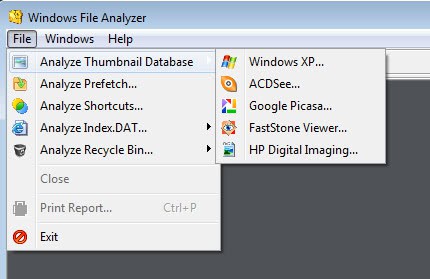Windows File Analyzer, Check Out What They Reveal About You

If you are a regular reader of this blog you know that the Windows operating system is by default saving user-related information into special system files. This includes information saved to the index.dat file which contains Internet Explorer cookies, the history and temporary file information, but also information about images in thumbs.db files, and other information types.
The free portable program Windows File Analyzer lets you analyze a variety of those special files that Windows and some other applications create automatically.
Windows File Analyzer
All you basically need to do is start the program after you have downloaded and unpacked it on your system, and use the File menu to pick one of the supported file types.
- Windows thumbs.db files
- ACDSee fpt files
- Google Picasa .db files
- FastStone Viewer dsviewer.db files
- HP digital Imaging db and dat files
- Prefetch files
- Shortcuts
- Index.dat files
- Recycle Bin information
Depending on the selection that you make, you are either presented with files to open right away or with a folder browser that you need to make use of to select a folder containing the file that you want to have analyzed.
Index.dat files are for instance displayed automatically, while thumb.db files need to be selected manually by navigating to a folder containing one.
Windows File Analyzer displays information right in the program interface afterwards. Depending on the selected file, information may include urls and times the files were accessed, file contents, as well as the file modification and last accessed dates. For thumbnails, it is also possible to view the images in the built-in viewer, and save them to the local system.
The application displays meta information in its interface, and offers to create reports that you can look at right away, or print out for further analysis. There is no way though to save the reports to a file on the computer instead.
While that may it make less usable for some purposes, it is still a useful program for many others. Especially the variety of supported file formats makes the program a viable option. Windows File Analyzer is compatible with all recent 32-bit and 64-bit editions of the Microsoft Windows operating system.
Advertisement




















Hmmm…seems I have no identity lol. No thumbs, no prefetch, nothing in index.dat :)